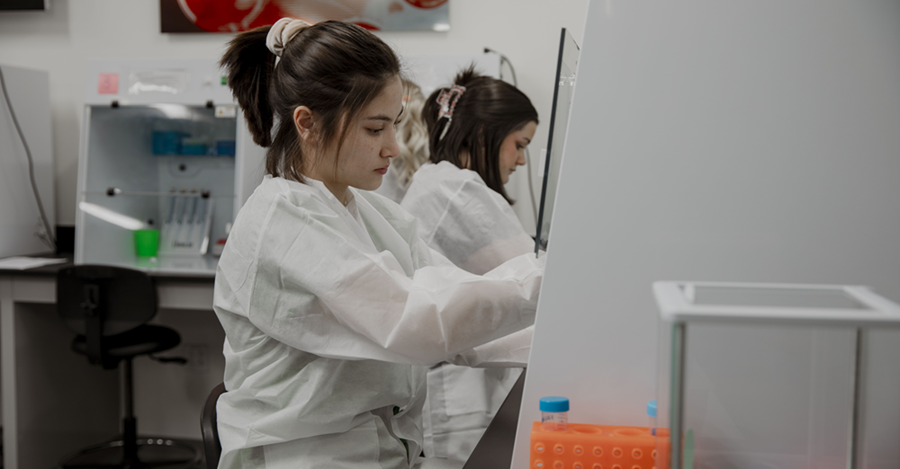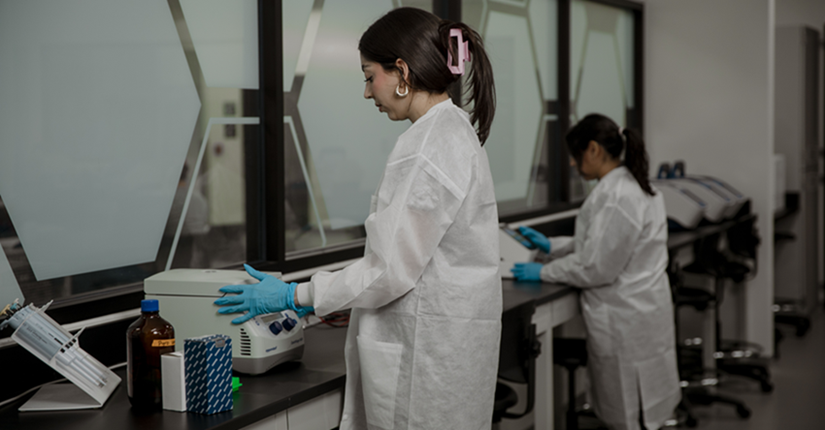Hidden Heroes of Health Care: Supporting a Shortage of Molecular Genetic Technologists

A Molecular Genetic Technologist is a qualified technologist (by an academic or applied education) that is able to perform testing on human samples for inherited diseases, acquired diseases and infectious diseases. According to the Mayo Clinic, these technologists analyze a patient's DNA to research, diagnose and treat many different diseases and disorders, such as cancers, congenital and nervous system disorders.
Ericka Hendrix, PhD, MB(ASCP), is a Professor and Program Director of Molecular Pathology M.S. at TTUHSC. We sat down with her to talk about the shortage of Molecular Genetic Technologists and how the TTUHSC Molecular Pathology Program is bringing awareness to the profession.
Shortage in Laboratory Sciences

The reason for this shortage? Current technologists are retiring, and COVID-19 pushed up that timeline for many after an increase in testing during that time. But because this field of health care is so “hidden,” there are not enough new technologists to fill the gaps.
“As Molecular Genetic Technologists, we specifically test for things that we detect in DNA and RNA,”she says. “So, when we can detect viruses like COVID, our workload increases dramatically without any new people coming on board.”
Hendrix also explains that because of COVID, many labs bought molecular equipment to run tests to detect the virus. Now that the pandemic has subsided, a lot of those instruments aren’t being used because there is a shortage of professionals that have the skills to bring on new molecular diagnostic tests.
Increasing Awareness
TTUHSC’s Molecular Pathology Program is one of eight in the nation that graduates students who are eligible to be certified in molecular biology, and to ultimately be able to perform this high complexity molecular diagnostic testing.
TTUHSC’s one-year graduate program is the largest in the nation. To support this shortage in Molecular Genetic Technologists, Hendrix says the program has teamed up with professional organizations (i.e. Program Director Advisory Committee) to help support program directors in teaching molecular biology, to encourage including it in their courses, or to even start molecular programs.
“We use Facebook for outreach,” Hendrix explains. “And I mentor new program directors to help keep these programs open and get new programs started.”
Hendrix says the TTUHSC Molecular Pathology Program is also trying to help this shortage by submitting an NIH grant to create workshops, so that people can learn the basics about molecular diagnostic testing in two weeks.
“We're trying to raise awareness to get people interested in the field,” she says. “I think the major hurdle for our field is that people don't know about it.”
Although there is currently a shortage of Molecular Genetic Technologists, Hendrix shares that the job growth rate in the field is expected to continue growing. She estimates that globally, it is currently a 17.3 billion dollar field, but by 2029 it is projected to be a 32.7 billion dollar field.
“Our advanced techniques of being able to sequence whole genomes has really spurred the advancement of this field and the continued growth,” Hendrix says. “But we need technologists that can run and analyze that really complex data.”
Related Stories
TTUHSC Receives $1 Million Gift from Amarillo National Bank to Expand and Enhance Pediatric Care in the Panhandle
TTUHSC School of Medicine leaders accepted a $1 million philanthropic gift from Amarillo National Bank on Tuesday (Feb. 10), marking a transformational investment in pediatric care for the Texas Panhandle.
Texas Tech University Health Sciences Center Permian Basin Announces Pediatric Residency Program Gift
TTUHSC Permian Basin, along with the Permian Strategic Partnership and the Scharbauer Foundation, Feb. 5 announced a gift that will fund a new pediatric residency.
The Ph.D. Programs that Shape Health Care
The Graduate School of Biomedical Sciences Ph.D. programs at TTUHSC provide the foundation, mentorship and research opportunities you need to pursue groundbreaking work.
Recent Stories
The John Wayne Cancer Foundation Surgical Oncology Fellowship Program at Texas Tech University Health Sciences Center Announced
TTUHSC is collaborating with the John Wayne Cancer Foundation and has established the Big Cure Endowment, which supports the university’s efforts to reduce cancer incidence and increase survivability of people in rural and underserved areas.
TTUHSC Receives $1 Million Gift from Amarillo National Bank to Expand and Enhance Pediatric Care in the Panhandle
TTUHSC School of Medicine leaders accepted a $1 million philanthropic gift from Amarillo National Bank on Tuesday (Feb. 10), marking a transformational investment in pediatric care for the Texas Panhandle.
Texas Tech University Health Sciences Center Permian Basin Announces Pediatric Residency Program Gift
TTUHSC Permian Basin, along with the Permian Strategic Partnership and the Scharbauer Foundation, Feb. 5 announced a gift that will fund a new pediatric residency.
